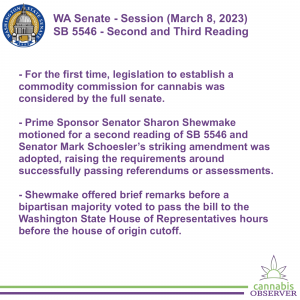Senators amended and passed legislation to create a framework for establishing a Washington State Cannabis Commission hours before the house of origin gateway was closed.
Here are some observations from the Wednesday March 8th Washington State Senate (WA Senate) Session.
My top 3 takeaways:
- For the first time, legislation to establish a commodity commission for cannabis was considered by the full senate.
- The Washington State Department of Agriculture (WSDA) oversees multiple agricultural commissions. Proposals for a cannabis commission had been put forward for years, with HB 1710 being the most recent attempt in 2022.
- In 2023, SB 5546 was heard by the Washington State Senate Labor and Commerce Committee (WA Senate LC) on February 9th. The committee passed a proposed substitute on February 14th.
- The Washington State Senate Ways and Means Committee (WA Senate WM) conducted a fiscal hearing on February 20th, and approved the bill without amendment days later on February 23rd.
- On March 3rd, the Washington State Senate Rules Committee (WA Senate RULE) included the legislation in a package of bills placed on the WA Senate second reading calendar.
- On March 2nd, sponsoring Senator Sharon Shewmake put forward Amendment S-2063.1 that proposed to redefine “active” producers and processors; enable electronic voting; and prioritize diverse representation on the commission.
- Prime Sponsor Senator Sharon Shewmake motioned for a second reading of SB 5546 and Senator Mark Schoesler’s striking amendment was adopted, raising the requirements around successfully passing referendums or assessments.
- Shewmake began the second reading of SB 5546 (audio - 1m, video) at which point Schoesler made a motion that his striking amendment be added to the measure (audio - <1m, video).
- The previous day, Schoesler filed striking amendment S-2185.3 which would incorporate Shewmake’s earlier amendment while also making additional changes:
- The participation criteria for a successful referendum was increased from 30% to 40% of producers and producer/processors.
- Subsequent changes to the assessment would require a supermajority of 60% assent, rather than a simple majority of 51%.
- Staffing for the commission would be contracted until assessment revenue exceeded one million dollars.
- A comparison document indicated Schoesler’s amendment would demand higher participation and consent rates than other agricultural commodity commissions established by statute.
- Schoesler told senators his change “moves this commodity commission more like the others that have been successful,” specifically by increasing the “percentage of eligible voters that must vote to create the commission; I think…we want to reflect the entire industry,” along with “borrowing from a model of smaller grossing commodity commissions, this requires that they contract for services like a small commodity such as asparagus or blueberries might.” He added this could change once “they do reach a gross of one million dollars, then they can manage the association from within” (audio - 1m, video).
- “I want to thank the senator for helping me with this amendment, and please vote ‘yes,’” said Shewmake (audio - <1m, video).
- Senators then adopted the striking amendment by voice vote (audio - <1m, video).
- Shewmake offered brief remarks before a bipartisan majority voted to pass the bill to the Washington State House of Representatives (WA House) hours before the house of origin cutoff.
- After moving for final passage, Shewmake explained “I have been working on this bill since 2019, the first year I arrived in the legislature” out of a belief there should be more “agricultural research and especially agricultural commissions directing that research. And boy if there isn't a crop that needs agricultural research and a commission to do that, this is cannabis.” She attributed commodity commission research with “making our food supply cheaper, making it safer, more environmentally sustainable.” Shewmake commented that commissions helped increase the yield of corn “by almost tenfold over the times that we've been doing this agricultural research and development.” Cannabis producers in Washington couldn’t benefit from that, she argued, since “it's really hard for one farmer to do this…on their own.” A commission could contract on behalf of producers to “do this research and share with the farmers as a group, thereby being able to amplify that knowledge and amplify this research,” Shewmake said, adding “I think this is going to make sure that Washington state continues its reputation for safe, high quality agricultural products” (audio - 1m, video).
- The final vote was 40 to 9, with nine Republican senators opposing the bill (audio - 3m, video):
- John Braun
- Chris Gildon
- Brad Hawkins
- Jeff Holy
- Drew MacEwen
- Ron Muzzall
- Ann Rivers
- Keith Wagoner
- After Senate Republican Leader Braun registered his opposition at the end of the roll call, five other Republican senators changed their initially supportive positions.
- After passage, SB 5546 would be transmitted to the WA House where the legislation was expected to be sent to the Washington State House Regulated Substances and Gaming Committee (WA House RSG) for policy consideration.
